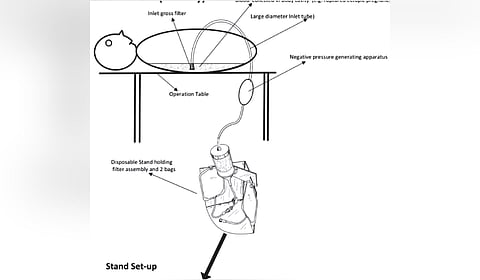

THIRUVANANTHAPURAM: In what could prove to be a life saver for many, the Digital University Kerala (DUK) has come up with an invention -- a gravity driven apparatus for reinfusing the blood of patients during surgeries -- that has won it its first Indian patent.
The device, developed by a team of researchers led by Dr Joseph Tharion, senior research scientist at DUK, could prove to be path-breaking for patients who rupture the fallopian tube in ectopic pregnancies. In such cases, delay in removing the blood collected in the abdominal cavity could even endanger the life of patients.
Globally, the mortality rate due to ectopic pregnancy is 3.5%, while in India it is 1.5-2%. “In tribal hamlets, northeastern states, conflict zones, and continents like Africa, fatality rates are very high,” Joseph told TNIE.
“The invention helps in situations that require salvaging the blood of patients. Bleeding due to the rupture of the fallopian tube can lead to life-threatening situations, as the blood is collected in the abdominal cavity. Usually, patients are unaware of the situation in the early stages of pregnancy. It is after they are is admitted to the hospital that the need for blood transfusion becomes apparent. Sourcing blood for a patient with a rare blood group can prove difficult. Our device plays a very decisive role in such situations. We received the patent in May,” he said.
The apparatus can be operated by a single person. The flow of blood is regulated using gravitational force. To transfuse the blood, the distal end of the first tube of the apparatus is inserted into the body cavity of the patient. The negative pressure-generating end is attached to the proximal end of the same tube to suck the blood out of the body cavity. The blood flow is initiated by compressing and releasing the system.
After filtering out clots, the blood is collected in blood bags. The entire process takes just two minutes, says Joseph. This blood can then be used for intraoperative transfusion.
“We have for now experimented with fluids that have the same viscosity as human blood. This has proved to be very successful. The device was presented in a seminar at Harvard University’s Radcliffe Institute for Advanced Study. We are now planning to test human blood in the device in collaboration with Christian Medical College (CMC) Vellore,” he said.
While the existing devices in the market are costly and heavy, Joseph added the new device can be developed within a budget of Rs 2,000 and is easily transportable. Dr John Eric Steephen (assistant professor, DUK), Dr Jose Joseph (assistant professor, DUK), Fr Vijay Anand Ismavel (CMC Vellore), and project technical assistant Ajeesh M V (DUK) were the other members on the team.